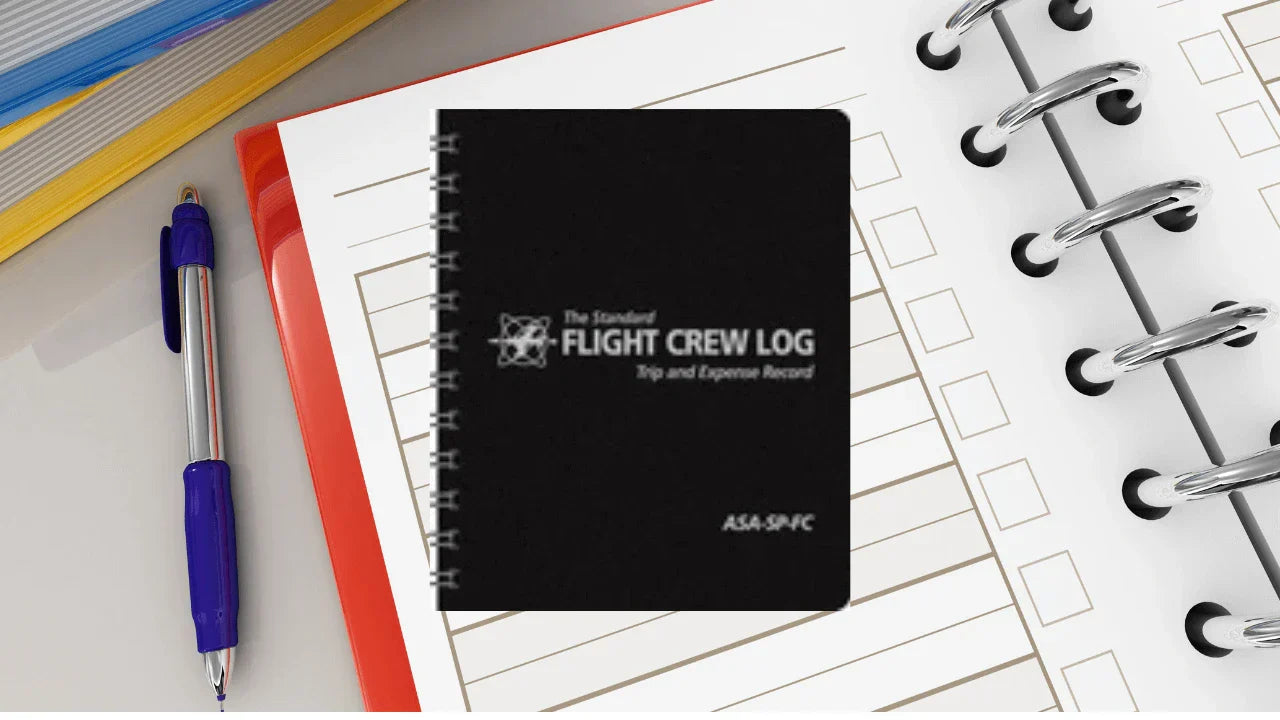Why the Best Logbooks Are More Than Just Paper
For pilots, memory isn't enough. Flight hours, routes, aircraft types, endorsements; they all need to be logged with the accuracy of a flight computer and the discipline of a checklist. That's why choosing the best logbooks is essential as pre-flighting your aircraft.
A pilot's logbook isn't just a record. It's a flying diary. A technical document. A proof of progress. A trusted companion. It tells the story of your aviation journey from the first taxi-out to your most recent crosswind landing in gusty coastal winds.
Whether you're a student pilot training over the Northern Territory or a commercial aviator logging turbine time between Sydney and Perth, having one of the best logbooks by your side can make all the difference.
In this guide, we'll explore what makes a logbook worth trusting and highlight one standout option used by pilots across Australia, the ATC Standard Pilot Log Book with a Clear PVC Cover.
What Defines the Best Logbooks for Pilots?
Not all logbooks are created equal. While a cheap notebook might seem like a quick fix, the best logbooks are built for durability, clarity, and compliance.
Here’s what to look for when choosing the best logbook:
|
Feature |
Why It Matters |
|
Durable Binding |
Withstands daily wear in flight bags and cockpit use |
|
Clear Layout |
Makes it easy to read, update, and verify flight records |
|
Regulatory Compatibility |
Meets CASA requirements for flight documentation |
|
Compact Yet Spacious |
Fits in your flight bag, but offers plenty of room to write |
|
Protective Cover |
Shields pages from moisture, fuel smudges, or cockpit grime |
The best logbooks are designed not just to record flights but to survive the life of a working pilot.
The ATC Standard Pilot Log Book: A Practical Favourite
Among Australian aviators, one model consistently ranks among the best logbooks, the ATC Standard Pilot Log Book with a Clear PVC Plastic Cover.
It's no surprise why this logbook has become a staple in both flying schools and professional cockpits. It combines simplicity with durability, meeting the practical needs of real pilots.
Why It Stands Out:
-
Crystal-clear layout for fast, neat entries
-
Pre-printed columns that match CASA's logging requirements
-
PVC plastic cover protects against dirt, rain, or spilled coffee during long flights
-
Lightweight and easy to slide into kneeboards or flight bags
Whether you're logging dual time in a Cessna 172 at Moorabbin Airport or recording your first solo IFR flight, this logbook handles it all, without fraying, smudging, or falling apart.
Real-World Benefits of Using the Best Logbooks
Choosing one of the best logbooks, like the ATC Standard Pilot Log Book, doesn't just help with recordkeeping—it supports your aviation journey in multiple ways.
1. Career Advancement
Hiring managers and check pilots will often review your logbook. A clean and well-maintained logbook demonstrates professionalism. Messy entries? That sends a different message.
2. Accurate Totals
When applying for ratings, endorsements, or jobs, accurate hour totals are non-negotiable. The best logbooks help you avoid errors that could hold you back.
3. Peace of Mind
Have you ever lost data from a flight app or tablet? The paper doesn't crash or run out of battery. The best logbooks act as a permanent backup.
4. Legacy
A logbook becomes a personal keepsake. It's the only piece of gear that stays with you from your first flight to retirement. It deserves to be the best.
How to Maintain Your Logbook Like a Pro
Even the best logbooks are only as good as the way they're used. Here are tips to keep your entries clean, professional, and audit-ready:
-
Use black or blue pen only—never pencil
-
Write clearly and consistently
-
Always log flight date, aircraft type, rego, route, flight time, and remarks
-
Check totals regularly to ensure accuracy
-
Please keep it in a protective cover (like the included PVC one)
Treat your logbook like a legal document, because it is.
Frequently Asked Questions
Can I use a digital logbook instead?
Yes, but CASA still requires access to readable, complete logbook records. The best practice is to maintain both digital and paper copies, especially one of the best logbooks available in physical form for cross-checking.
What's the advantage of a PVC cover?
Australia's flying conditions vary, coastal humidity, outback dust, cockpit spills. A PVC cover adds a layer of protection to keep your logbook intact throughout.
Is the ATC Log Book CASA-compliant?
Yes. It meets CASA's requirements for flight recording and includes all the necessary fields for pilot logs.
How many hours can it record?
The ATC logbook provides ample space for hundreds of flight entries, making it ideal for both students and professional pilots.
Is it suitable for commercial pilots?
Absolutely. It's designed with both training and professional operations in mind. Many charter and airline pilots use the ATC as their primary logbook.
Let Your Logbook Tell Your Story
Your logbook is more than just numbers on a page. It tells the story of every takeoff, every radio call, every lesson learned at 6,000 feet. Choosing the best logbooks ensures that the story is clear, complete, and professional.
The ATC Standard Pilot Log Book with Clear PVC Cover isn't just affordable, it's reliable, tidy, and purpose-built for Australian pilots navigating the skies every day.
Whether you're a first-time solo student or a senior captain with 10,000 hours logged, you deserve a logbook that matches your journey.
Explore the ATC logbook today at The Aviator Store – Pilot Logbooks and make every logged hour count.

